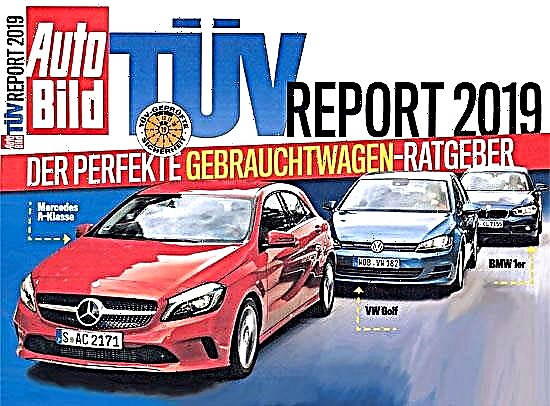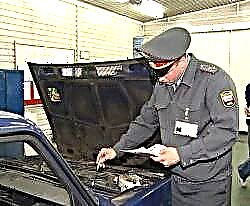The fact that from April 3, 2011 on the territory of the Russian Federation new rules for registering cars will be introduced is no longer news, this will not surprise motorists. Another thing is that the automotive legislation has not pleased us with such a large number of "advantages" for a long time, which will have the force of law very soon. There are few "minuses", but they are significant. In addition, as in any Russian law, there were some "pluses with a trick" ...
Innovations with a minus sign: castling with written off numbers is canceled in the old way.
In any good law, of course, there are "unpleasant" moments. Let's start the conversation about the new law just with a debriefing with a minus sign.
In Russia, the model of buying recycled cars with their subsequent restoration has gained a lot of practice (mainly, these were old models of foreign cars - relatively high quality, since foreign cars, and cheap ones, since written off from the register).
Now such castling is impossible. Those. if the car is written off, roughly speaking, to a landfill, then there it belongs. You will not return it to the register by any legal means. The decommissioned car is just a piece of iron, rusty in places. The car "resurrection" for "scrapped" cars from April 3, 2011 is officially canceled.
In addition, now a situation is possible when you buy a car “hand-held” (“carefully” taken off the register by the owner in advance), but do not have time to re-register it to yourself within 30 days, then - write it was gone. Your car will be officially written off, i.e. will put in official documents "termination of registration". If your car is in transit, then the re-registration period is even shorter - only 20 days. Otherwise: you are tortured to pay the bills coming from the tax office.
The innovations, of course, are unpleasant, but what can you do - there are much more "pluses". The thing is that now state numbers on cars will receive the status of permanent ones, in connection with which the above is happening. The fact that the numbers received a new status gave rise to positive shifts, and there were an order of magnitude more of them, although some of them are, as they say, "with a catch."
The main positive innovations: your nerves and wallet will now be in order.
Everything seems to be clear with the first innovation. Many car owners used to get stumped, wasting money, time and nerves when, when moving to another city, they re-registered their car. From April 2011 this process will be greatly simplified. As soon as you register a car at a new place of residence, it will be removed from the register at the old “MZh”. Thus, you and your car will receive a new registration together and there will be no problems with the traffic police of the region where you previously lived. Unbelievable, but it is a fact. Rejoice - in a word, the number of your visits to the traffic police lair will significantly decrease (at least twice).
Another hello from the program "Obvious-Incredible" happened with the purchase of a car. In that case, when buying "from hand", if the seller of the car and his buyer live in the same region, the process became as simple as an orange. Now, new data in connection with the purchase is entered into the vehicle passport, after which you will be given a new car registration certificate. This is a significant reduction in queues and anxious waiting associated with the acquisition of a new "iron horse".
In addition, you can attach your old number to the new car (you say: the possibility of such an option was available before, but now it is enshrined in law).
Another innovation related to old numbers concerns this aspect: old numbers, officially recognized as written off, will now reappear on cars (if the car owner registers the car and does not like the proposed “new” numbers, he can choose from the archive "Old" available at the place of registration). This is due to the fact that in large regions of the Russian Federation a shortage of license plates has recently begun to affect (the overcrowding of the vehicle fleet made itself felt, finally, which is why the traffic police decided to turn to the archives).
Everything seems to be clear with the described processes: we are moving on to the vague part of the new law.
Mysterious Russian legislation.
In fact, probably only in Russia they come up with laws with a "double bottom" (maybe a habit - so that later it would be convenient to bypass them :)). Only in Russia do they prescribe laws that may be incomprehensible to literate citizens. The question arises: the one who approves these laws ponders their meaning? Or as in our case: has the person who approved this “automobile law” ever got on a vehicle with a more complex device than a bicycle?
 So, about the "pluses with a trick" ... Accounting can be officially made and approved by the relevant authorities, even if the signs on the engine number of your car are difficult to read (in general, this whole process of "accounting", which was previously comparable only to a trip to the dentist ", Will now be greatly simplified). The engine number will no longer be checked (the innovations, however, did not extend to the frame and chassis numbers). Representatives of the traffic police, in the official comments, said that in most old foreign cars this number is, in principle, impossible to read.
So, about the "pluses with a trick" ... Accounting can be officially made and approved by the relevant authorities, even if the signs on the engine number of your car are difficult to read (in general, this whole process of "accounting", which was previously comparable only to a trip to the dentist ", Will now be greatly simplified). The engine number will no longer be checked (the innovations, however, did not extend to the frame and chassis numbers). Representatives of the traffic police, in the official comments, said that in most old foreign cars this number is, in principle, impossible to read.
The new law generated a lot of controversy. For example, one of the points of misunderstanding of car owners is the following: during a technical inspection, the inspector will check the data of the technical passport and registration certificate, - and if the data turns out to be different? After all, THAT involves inspection of engine numbers, VIN, chassis ... It turns out a misunderstanding.
Inspection, under the new law, will be stricter than state registration. If the engine number is not taken into account by inspectors when registering, then, therefore, you can later change your engine to a more modern and / or economical one. In this case, the state probably loses in taxes (meaning the tax on the power of the car's engine), but is it profitable for the state? And why would the tax legislation take such measures when the situation in the country is still on the brink of a crisis? By the way, if you change the motor to a more powerful one, then you still have to contact the authorities (your data will be updated).
And what about the inspector again, what will the inspector say if the registration certificate contains an engine of one power, and a completely different one is recorded in the data sheet? It turns out that he should not do anything if it has the force of law.
The new rules for registering cars in the Russian Federation were published in printed form on March 23rd (Rossiyskaya Gazeta), so everyone had time to familiarize themselves with them and draw conclusions for themselves. The main achievements of the new law are that now there will be much less paperwork (ie, for example, you can register your car in any region of the Russian Federation). Such information for thought for motorists. In any case, it will be better than before, in any case, more like a European vehicle fleet than before. Yet the dashing 90s have already passed ten years.











